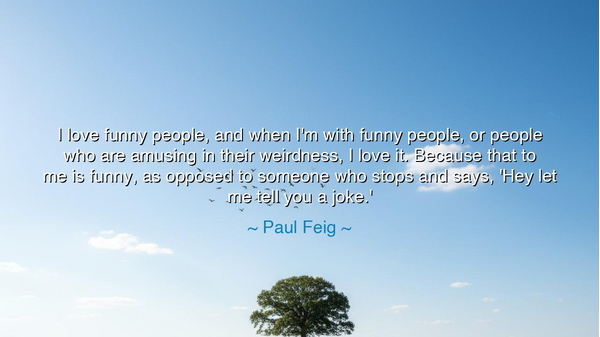
I love funny people, and when I'm with funny people, or people
I love funny people, and when I'm with funny people, or people who are amusing in their weirdness, I love it. Because that to me is funny, as opposed to someone who stops and says, 'Hey let me tell you a joke.'






In the words of Paul Feig, “I love funny people, and when I'm with funny people, or people who are amusing in their weirdness, I love it. Because that to me is funny, as opposed to someone who stops and says, 'Hey let me tell you a joke.'” — there lies a truth that reaches far beyond laughter. It is not merely about humor, but about authenticity, about the sacred beauty of being oneself. Feig, a creator of stories that celebrate the awkward, the odd, and the human, speaks of a kind of humor born from life itself, not from performance or pretense. His words remind us that what truly moves the spirit is not the polished joke, but the raw music of genuine personality.
For in every age, the ancients and the wise have known that truth and laughter are siblings. The kind of humor that endures — the kind that heals and connects — springs not from rehearsed wit, but from the natural strangeness of being human. Feig’s affection for “people who are amusing in their weirdness” is, at its heart, an affection for sincerity. The man who says, “Let me tell you a joke,” seeks control — he constructs laughter as an act of conquest, shaping it to impress. But the truly funny person, the one who lives humor rather than performs it, carries joy like a lantern that shines effortlessly, lighting the world around them without demand or design.
The meaning of this quote runs deep: Feig celebrates the art of being real. To be funny is not to fabricate laughter, but to reveal truth in such a way that it disarms fear and kindles warmth. The great playwrights of old — Aristophanes, Shakespeare, Molière — all knew this secret. Their greatest fools were not jesters by trade, but truth-tellers in disguise, whose humor sprang from their keen understanding of human folly. The “weirdness” that Feig loves is that same divine foolishness — the willingness to be vulnerable, to reveal one’s imperfections without shame, to turn one’s own quirks into light.
Consider Lucille Ball, a woman whose genius reshaped the landscape of comedy. Her humor was not in clever punchlines, but in her unapologetic honesty. She fell, she failed, she blushed, she laughed — and in doing so, she gave permission for the world to laugh with her. Her comedy, like Feig’s ideal of funniness, was born of truth and authentic imperfection. When Ball made the world laugh, it was not because she told jokes, but because she embodied life in all its mess and wonder. This is what Feig means when he praises the “amusing in their weirdness” — those who dare to be themselves, who turn life’s chaos into connection.
The origin of Feig’s insight lies not only in his career as a director and storyteller, but in his personal understanding of humor as empathy. Having once been an outsider, he learned that laughter, at its best, is a bridge — a way for people to understand one another beyond judgment or difference. It is no accident that his stories, from Freaks and Geeks to Bridesmaids, celebrate the misfits — the awkward, the misunderstood, the unpolished souls who stumble through life with sincerity. Feig recognizes that the truest comedy is compassion disguised as laughter: it is the recognition of our shared strangeness.
The lesson we must take from his words is this: seek not to entertain, but to connect. If you would bring laughter into the world, do not memorize the lines of others — speak from the truth of who you are. Be unafraid of your weirdness, for it is the mark of your individuality, and it may be the very thing that brings joy to another soul. The ancients taught that to know oneself is the beginning of wisdom; Feig reminds us that to be oneself is the beginning of humor.
Therefore, my friends, live as those “funny people” whom Feig admires — not those who perform laughter, but those who embody it. Let your quirks shine without shame. Speak with warmth, act with sincerity, and let the music of your nature play freely in the company of others. For the laughter that springs from truth has no end; it echoes in memory like the laughter of gods.
In the end, Paul Feig’s wisdom is both simple and profound: the world does not need more jokes — it needs more genuine souls. To be funny, one must first be human. To be amusing, one must first be authentic. And to bring light to others, one must dare to stand in the open, beautifully imperfect, and laugh not at life, but with it.






AAdministratorAdministrator
Welcome, honored guests. Please leave a comment, we will respond soon